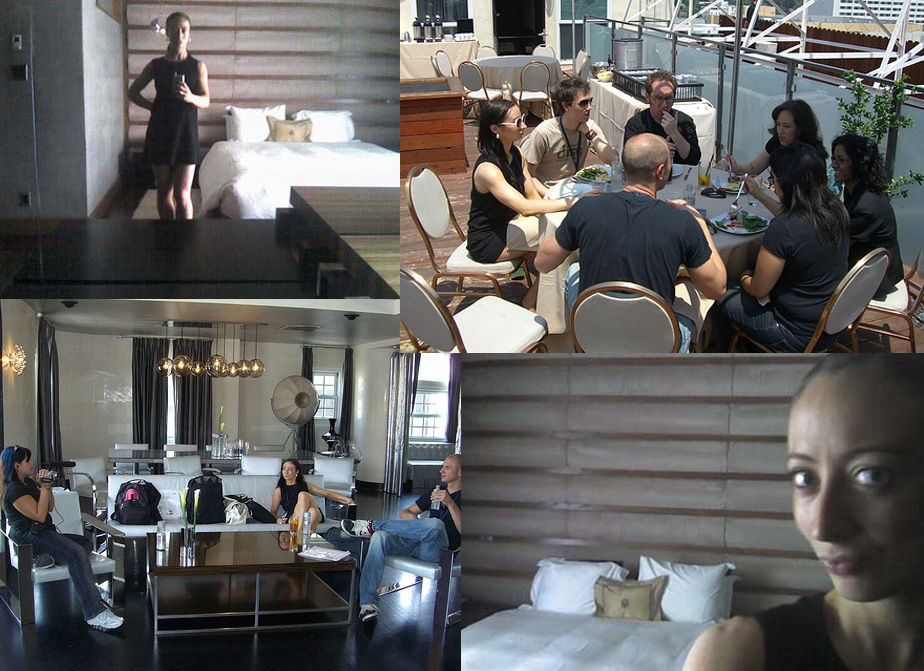Last week, in response to a post on Eminism about Barnard president Debora Spar’s team’s “disastrous attempt at viral marketing,” I wrote How Not to Pitch: Barnard President Debora Spar’s Team Pisses Off Feminists En Masse.
I’d like to follow up with some suggestions on how you should pitch bloggers (without pissing them off).
The photos above — taken at the Roosevelt Hotel in Los Angeles — are from a blogger event I was invited to a few years ago by Ford Motor Company. A dozen or so bloggers were put up in a nice hotel, wined and dined, and given Fords to drive for a few hours as part of a check-out-LA scavenger hunt.
That was a pretty sweet deal. It was appropriate because Ford is a multinational corporation, asking for favors from bloggers. The power differential was very large.
Which brings me to my basic principle:
There is a hierarchy in the world of who has the resources. If you are asking a favor of someone with more resources, it would certainly help your cause to offer a mutual benefit — for example, you could offer to put an organization’s logo on your project as a sponsor in exchange for the publicity — but it’s also fine to just go ahead and ask, beg, plead, etc. But if you are asking down, you should offer some kind of reciprocity in proportion to the differential in resources (privilege, money, power, etc.) Otherwise, it is rude and presumptuous.
Thus, a multinational corporation wanting coverage largely from broke comedians appropriately offers a free trip. A publishing company offers advance copies to reviewers, providing both a free book and the cachet of being the sort of person who receives advance copies of things. A film wanting some blogger coverage ought to invite local bloggers to a screening. (A smaller-budget film could see who wants to hold an apartment screening, and send advance DVD copies and bags of microwave popcorn — look, there’s your under-$100 marketing campaign!) A well-known blogger who wants coverage from lesser-known bloggers could simply link back to that coverage, retweet liberally, and offer public thanks.
Sometimes it’s not clear who has more resources, power, and privilege (or, neither party has many/much of any of those things). No problem. Just don’t spam people, be polite, and acknowledge that the people you are asking for coverage are fully-formed human beings blogging for their own purposes.
If they are professional bloggers who are required to post 10 times a day, sure, send them a pitch they can more or less run as-is. You’ve helped them by making their job easier.
But if they run their own ideologically-motivated blogs, there is about zero chance that the same thing will work; in fact, you are likely to offend with this approach.
And with bloggers who run blogs to promote their own careers, offer to share your platform in some way, by promoting their work in return.
Here are some tips:
Let’s start with the obvious: Actually read the blog you’re pitching to. You don’t have to lie and say you’re a longtime reader. Check out the About page and a few recent posts, then try, “I was just turned on to your blog and really enjoyed your recent post (Title). I agree that (say something intelligent here that shows you read at least one post).”
Try retweeting some of the blogger’s posts and otherwise getting on her radar before emailing her. (If she has nothing you think is worth RTing, why do you want to be on her blog anyway?)
Do not have an underling make a list of, say, “comedy blogs,” and then send them all the same pitch about the new comedy film you’re promoting. There are some blogs out there that cover the world of comedy and are hungry for content, but most “comedy blogs” are in fact the blogs of individual comedians being funny and promoting their own careers. Not the same thing. If you want their attention, invite them to a screening. At least pretend to respect their opinions about what’s funny. Don’t suggest that someone who would really like their own book/TV deal promote, without compensation of any kind, a competitor’s book/TV deal. That shit is infuriating. I’m sure this is true of most other industries — there are tech blogs that exist to post 30 times a day about every innovation, ever, and there are tech blogs that exist for the purpose of getting work for the blogger. If someone’s entire purpose in writing about software engineering is to demonstrate his competence and insight and therefore get more clients, you need a different pitch than, “This app you didn’t design is super amazing.”
As such, if you make a list of “feminist blogs,” you can’t send them all the same pitch with “Great post!” as the subject line. If you don’t have time to read enough of a blog to figure out whether the entire point of the blog is to deconstruct your type of feminism, then don’t go asking for favors. Or, alternately, you could send a pitch that acknowledges, “We may have different takes on X — would you be interested in a public discussion of this issue?” Or you could publish, on your own blog, a roundup of different views on the issue ahead of time, to show that you respect what the blogger has to say. And then, once you’ve sent some traffic and attention the blogger’s way, ask the blogger to link to or comment on the thing you are promoting.
Offer a free book if you’re asking for a review. Or even a few chapters as a PDF. Suggesting that someone should buy your book in order to review it is really asking for two favors at once, which is too many.
When geographically and financially possible, ask bloggers to a lunch/panel/event in which they can actually participate, ask questions, network, etc. Let them take pictures with you (and of course with each other). This is golden blog content! Buying 12 people lunch will probably get you 12 photo-filled, interesting blog posts! Sending 200 spam pitches will not likely get you 12 interesting blog posts of any kind.
I’m pretty sure the best way to get a blogger to write about your podcast is to ask her to appear on it. If you want to preserve your own authority, it would be fine to ask several bloggers to appear on the same episode, so it’s clear there’s one of you and a panel of them.
And if you think a blogger isn’t “important enough” to be a guest on your podcast at all, then don’t ask her for favors.
If a podcast has already occurred and you want bloggers to link to it, why not post below the podcast link a list of suggested readings on the topic, preferably with a brief and thoughtful description of each? Then, email all the bloggers whose posts you just suggested, and let them know that you liked their post and have included it in a list of suggested readings on your own blog. That would make the bloggers much more likely to listen to the podcast, find something to comment on, and write about it, or at least to link back to you, retweet, etc.
Since Emi’s post, I’ve seen a number of messages from Barnard alumnae who are just embarrassed by this whole thing.
The thing about being affiliated with such an august institution as Barnard, though, is that it would have been so easy to conduct a publicity campaign for very little money because 1) Barnard is a big name, and 2) Barnard is in New York, as are many feminist bloggers.
How hard would it have been to arrange some blogger events at Barnard? (Or even just send out some books while making the recipients feel at least a little bit important for being recognized and chosen for something?) When you’ve already got a university infrastructure, hosting a lunch or a panel or a debate or an open discussion in any format is par for the course. There are people whose entire job it is to make events like that happen every day.
I hope this post has been helpful! One thing I hope I’ve gotten across clearly is that I’m not at all saying you shouldn’t pitch, or that you have to spend money you don’t have in order to pitch.
I’m saying that people and organizations with resources and power should be cognizant of that, and fair, when asking for favors.
And I’m saying that while a good blogger PR campaign can be had with money (by hosting events), or by trading publicity (if you have a platform), it can also be had by taking the time to read and research before you pitch, and otherwise by treating bloggers as individuals with agency, and with their own ends and goals.








